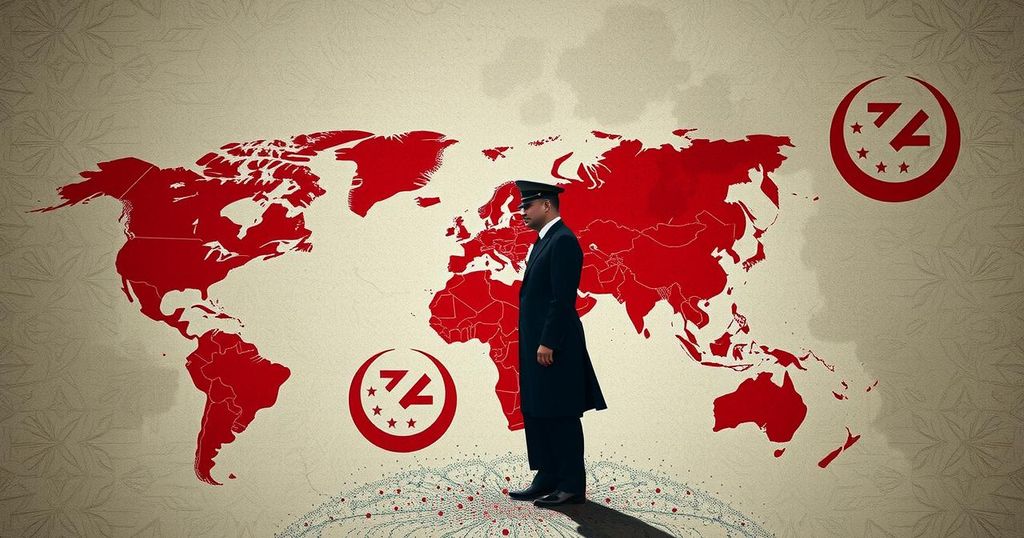The recent overthrow of Bashar al-Assad in Syria poses a significant blow to Russia’s prestige and geopolitical ambitions. After nearly a decade of supporting Assad militarily, his reported asylum in Moscow marks a dramatic unraveling of Russian influence in the region. As military bases’ security becomes a priority amid increasing opposition power, Russia’s narrative shifts to address these setbacks while simultaneously focusing on its national interests elsewhere, particularly in Ukraine.
The recent events in Syria mark a significant turning point, indicating the downfall of President Bashar al-Assad, a move that has raised serious concerns regarding Russia’s influence and standing in the region. For nearly a decade, Russia’s military involvement was ostensibly aimed at propping up the Assad regime. However, the loss of Damascus and the reported asylum granted to Assad in Moscow have revealed a dramatic unraveling of Moscow’s strategy, leaving it seemingly powerless to intervene during this critical juncture.
The Kremlin had positioned its military presence in Syria as a demonstration of its status as a global power and a direct challenge to Western dominance. Vladimir Putin’s earlier announcement of “mission accomplished” in 2017 signified confidence in Russia’s military operations. Nonetheless, recent developments have brought to light that the strategic gains from this engagement may now be jeopardized as opposition factions gain ground.
In the wake of Assad’s departure, uncertainty looms over Russia’s military bases in Syria which had been granted long-term leases as part of the arrangement with the Assad administration. The Kremlin has reassured the security of these bases but has also reported they are on high alert. Observers are questioning the immediate future of Russia’s geopolitical footprint in the Mediterranean as they navigate the complexities brought on by the Syrian armed opposition.
Moreover, the Russian media has begun attributing blame to the Syrian army for their inability to defend against opposition advances, highlighting the deteriorating situation and raising doubts about the competence of Assad’s forces. This discourse suggests a potential shift in narrative where responsibility is placed on the Syrian military rather than the Russian support system.
Russian officials are now prioritizing national security discussions around their military operations elsewhere, particularly in Ukraine, indicating a subtle shift in focus amidst the fallout from Assad’s removal. This pivot is significant as it reflects Russia’s commitment to manage its domestic narrative and divert attention from the implications of their Syrian involvement.
The fall of Assad represents not merely a political upheaval in Syria; it is a profound challenge to Russia’s international credibility and national interests. The Kremlin faces the difficult task of reconciling these losses against its past proclamations of triumph in the region while simultaneously attempting to reassert its control and influence in the face of stark realities.
The situation in Syria has been a focal point of geopolitical tension, particularly since Russia’s intervention in 2015 to support Bashar al-Assad. By deploying troops and conducting military operations, Russia aimed to re-establish Assad’s regime and, subsequently, to position itself as a significant player in Middle Eastern affairs. The strategic military bases awarded to Russia were not only instrumental for regional security but also for furthering Russian influence in surrounding regions. The dramatic shift in power represented by Assad’s exit highlights the fragility of Russia’s strategic investments.
In summary, the fall of Bashar al-Assad serves as a critical juncture for Russia, challenging its perceived strength and strategic ambitions in the Middle East. As Moscow navigates the complexities of supporting its military assets in Syria while addressing its broader geopolitical interests, the implications of this upheaval may resonate throughout its international engagements. Russia’s efforts to manage this narrative and reposition itself in response to changing dynamics will be closely watched in the coming days.
Original Source: www.bbc.co.uk






